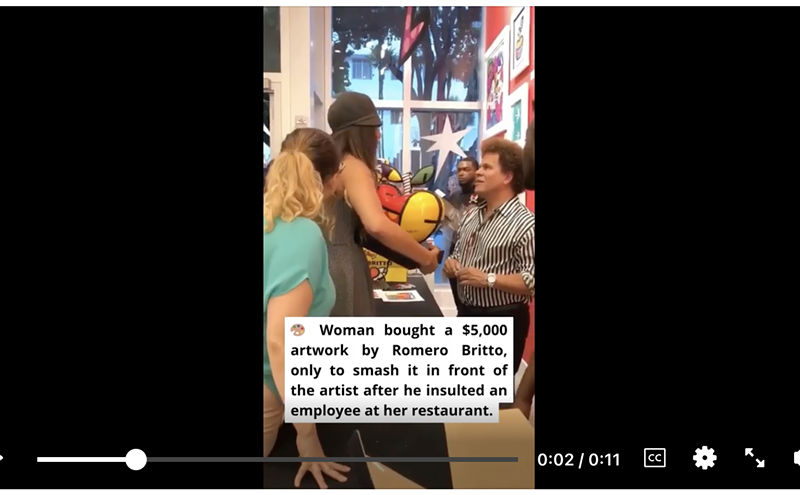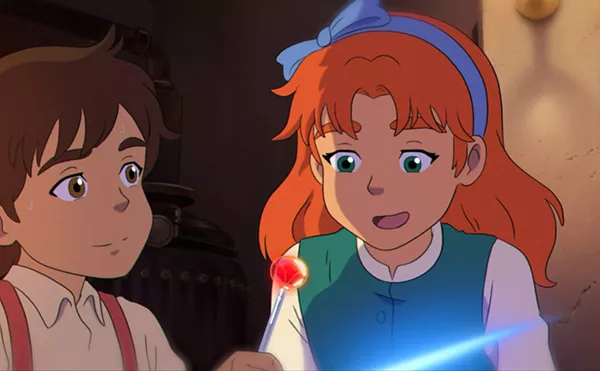Gunmetal Blues, now showing at the Actors' Playhouse, is a car accident. With the exception of two talented actors and a nifty film noirish set, everything about it is an unfortunate mistake. Given the fact that the play has been billed in press releases as a "musical mystery sensation...with a touch of comedy," I expected the production -- first presented in 1989 by AMAS Musical Theatre in New York City -- to contain intriguing and innovative elements. But Gunmetal Blues is neither intriguing nor innovative. Its songs and lyrics are painfully contrived and often constructed in such a way that they reminded me of John Cage's experiments in atonal music, which can cause the listener real physical and emotional distress. As for mystery, the only one I detected was how this amateurish attempt at playwriting could have been mounted in two other venues -- NYC and San Francisco -- and actually have received some good reviews. Perhaps a different cast and director made a miraculous difference, although I find that hard to believe when you consider the play's severe limitations.
The story centers on Sam Galahad, a private eye with a bad attitude and a drinking problem. As the action begins, he enters the Red Eye Lounge to linger over a bottle of booze, occasionally bitching to the resident piano man, a talentless irritant named Buddy Toupee. Then the requisite mysterious blond, Laura Vesper, sweeps in, hiring Sam to find a rich and disturbed heiress named Jenny Wasp (would someone please explain this bee joke to me?). Jenny is the daughter of millionaire developer Adrian Wasp, recently found dead in his apartment, an apparent suicide. As it turns out, Jenny was also the girl who broke Sam's heart ten years ago by disappearing from his life after the two shared a single drink. Talk about love at first sight.
Various subsidiary characters (a bag lady named Princess, a throaty-voiced gangster, a cantankerous cop) pop in and out of the plot in an obvious attempt to make the mystery more complex. However, because the same actress plays Jenny, Laura, and Princess, it's no revelation when Sam discovers that A brace yourself A Jenny and Princess are the same girl. Of course, this whole production is meant to be a parody, so the authors want it to be comical and illogical. But parody is one of the hardest theatrical forms to pull off. If you want to witness this genre done to perfection, go see the film True Lies, a likable spoof of James Bond films.
In parodies such as Gunmetal Blues and True Lies, a flamboyant style is milked for its excesses. To do this properly, the writing and acting must be of the highest caliber, with the audience recognizing that the overblown dialogue and exaggerated plot elements are intentional. For instance Gunmetal Blues tries to make light of the kind of dialogue originally heard in Sam Spade detective films -- repartee often rife with overripe adjectives. So the authors offer such lines as, "The sky went from gray to a kind of blue." This is neither funny nor a witty twist. It's just banal and boring.
The plot involves a blond and a depressed private eye. However, the blond's main characteristics are not her appeal and her distress (as was the case in the original films), but rather a psychotic personality disorder, rendered here too real to be amusing. And the reason for the detective's gloom -- that broken heart after his brief encounter with Jenny -- hardly justifies his constant grimace. An effective spoof would cast a transvestite in the role of the dazzling blond, and place the detective in a twelve-step program. Charles Ludlam understood this technique perfectly when he wrote his sendup of the suspense genre, The Mystery of Irma Vep.
Wayne LeGette as Sam and Meghan Moroney as the various women (all blonds, incidentally) play each scene the same way -- he's stoic and she's breathy. But that fault lies with the script, not with the actors. And both have excellent voices, holding on to melodies against all odds, even when Buddy slams out the wrong notes on the keys and harmonizes way out of tune.
As bad as the music, plot, and dialogue are, there's no doubt who's primarily responsible for this car accident. Phill Greenland as Buddy Toupee (the meatiest role) strikes out on just about every score. Buddy is supposed to be an untalented lounge lizard with dreams of glory. But again, because this is spoof, the audience should sense that the performer playing the role is so good he can skillfully make mistakes -- at the end of the show, when Buddy plays classical music, the script calls for him to play brilliantly. Elton John would have been perfect in the part.
Sadly, Greenland is inept throughout. He strains to sing rather than actually singing, plays the piano as though he violently despises the ivories, and acts with more of an exaggerated lisp than a snappy wit. Buddy should be the joke, not Greenland. The audience should be amused by the role, not embarrassed for the actor. To play a bad actress in the film Death Becomes Her, Meryl Streep was hired -- not Pia Zadora. With Pia, as with Greenland, it becomes impossible to ascertain where reality ends and parody begins.
Before the opening curtain, director David Arisco made a subtle sort of apology, explaining that he had been rushed into mounting this production. The lack of attention and time certainly shows, both in stiff staging and uneven pacing that effectively kill any hope of comedy. Arisco also announced that opening night would serve as the show's first performance before a live audience; there were no previews. Note to Arisco: Previews were designed to unmask potential theatrical disasters. Oddly, watching woefully inadequate productions, just like watching great drama, can have a lasting effect. With sublime works, memories are fond and the aftertaste sweet. In the case of Gunmetal Blues, I left with a headache and a sickly sensation I still haven't shaken. During the dog days of a South Florida summer, there's no reason to add to your overall physical discomfort.












